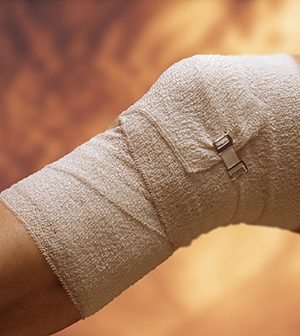- Could Your Grocery Store Meat Be Causing Recurring UTIs?
- Are You Making This Expensive Thermostat Error This Winter?
- Recognizing the Signs of Hypothyroidism
- 10 Strategies to Overcome Insomnia
- Could Artificial Sweeteners Be Aging the Brain Faster?
- Techniques for Soothing Your Nervous System
- Does the Water in Your House Smell Funny? Here’s Why
- Can a Daily Dose of Apple Cider Vinegar Actually Aid Weight Loss?
- 6 Health Beverages That Can Actually Spike Your Blood Sugar
- Treatment Options for Social Anxiety Disorder
Got Knee Pain? What You Need to Know About Alternatives to Surgery

Arthritis in the knees can strike people as young as 45, with symptoms severe enough to limit activities and harm quality of life. What can be done about it?
First, know that inactivity isn’t the answer. You need to move, so try low-impact exercises like walking and swimming. Researchers are also looking at possible benefits from interval training rather than continuous workouts.
If you’re overweight, research has shown that diet, along with exercise, can reduce pain and improve function.
Studies on the popular supplement glucosamine have yielded conflicting results over the years, but one explanation for the mixed findings has to do with the different formulas that were used. Success in Europe and other parts of the world was found with a daily 1,500-milligram dose of patented crystalline glucosamine, according to the International Journal of Rheumatic Diseases.
Acupuncture helps some people find relief, as does daily do-it-yourself acupressure — using just your fingertips on the painful areas.
More invasive procedures, like injections of corticosteroids or hyaluronic acid, have limited benefits and possible side effects. And knee surgery, often suggested to “wash out” debris inside the joint, does not seem to result in significant pain relief, better function or greater benefits than conservative strategies like exercise therapy.
One helpful suggestion came from an analysis of studies involving exercise among people with knee and other joint pain and published in the Cochrane Database of Systematic Reviews. Work closely with your health care team to understand how exercise can help you and to find types of activity that you’ll enjoy. Your team may include not only your primary care doctor, but also an orthopedist and a physical therapist who can design a workout based on your needs and your abilities.
More information
The Arthritis Foundation has many exercise tips for people with osteoarthritis knee pain.
Source: HealthDay
Copyright © 2026 HealthDay. All rights reserved.










